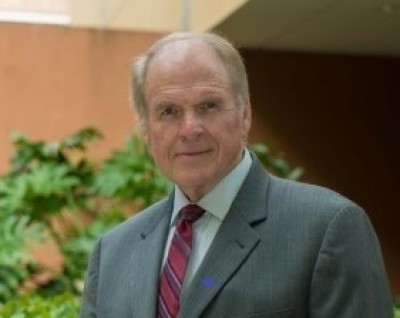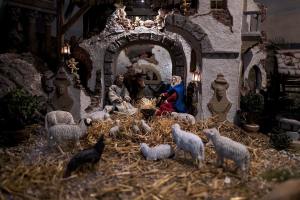The 2020 election, untethered prophets: What does healthy prophetic 'reflection' look like? (pt 2)
Woe to the prophetless nation!
“Where there is no prophetic vision the people cast off restraint but blessed is he who keeps the law.” (Proverbs 29:18 ESV)

Charles (Chuck) Colson spoke prophetically to nations. Chuck arose from the ashes of the Watergate-sparked collapse of the Nixon presidency when he gave his life to Christ.
In 1973, after three years as a junior aide in the Nixon White House I had become a pastor near Mobile, Alabama. A Washington friend phoned and told me Colson, whom I had known at a distance in the White House, had turned to Christ. Like Jesus’s disciples when they heard of the resurrection, I “disbelieved for joy.” (Luke 24:41)
In other words, it was just too good to be true. I had assumed tough, cynical Colson was an agnostic, or maybe even an atheist.
My Washington friend confirmed Chuck’s conversion as genuine. But I could see for myself. Chuck had been sentenced for Watergate-related infractions to a federal prison at Maxwell Air Force Base, Alabama — three hours from my home.
Two days later, I was on my way. I had been at the bottom rung of the White House staff and Chuck had been in Nixon’s inner circle, so I did not know how he would receive me — or if he would. Pecking order is a big deal in the White House.
I was amazed when Chuck greeted me with a powerful bear hug. Almost immediately I asked: “Chuck, how did the Watergate scandal happen?”
“We didn’t take time to reflect,” he replied.
Now, amid the chaos of the 2020 election, America is in a period calling for deep reflection. Allied soldiers marching into Germany in the aftermath of the Second World War called the bombed ruins the “rubble world.” Spiritually, ethically, politically, culturally, socially, we now gaze on a “rubble world” because so many of our key institutions — church, family, education, governance, businesses — lie in smoldering ruin.
“Prophetic vision” is essential for deep reflection that takes in the “heights” as well as the “depths.” When John is about to receive the Revelation visions he sees “a door standing open in heaven,” and hears a voice: “Come up here, and I will show you what must take place...”
One gets the most comprehensive view of the whole landscape from “up here” — God’s perspective. And the higher the position the more profound the view — like the stunning “Earthrise” photo of the “blue marble” Earth taken by the 1968 Apollo 8 crew 175,000 miles away. That photographic vision inspired Archibald MacLeish to write:
To see the Earth as it truly is
small and blue and beautiful
in that eternal silence where it floats
is to see ourselves as riders
on the Earth together,
brothers on that bright loveliness
in the eternal cold.
To see things as they “truly are” requires prophetically gifted people, well-tethered to a local church which is itself tethered to biblical authority and order.
That means the New Testament church, far from being “non-essential,” is crucial in this reflective hour, along with spiritually mature leaders who can discern the prophets and the messages. (1 Corinthians 14:29)
Without the prophetic vision, the people of the nation “cast off restraint.” The default of a fallen world is always downward. The powers of darkness seek fragmentation rather than unity. Entropy takes down and apart people and their institutions. As I put it in Part 1, the fundamental struggle in the fallen world is between cosmos (order) and chaos (disorder). Without vision that lifts us upward we descend into the ultimate chaos — Hell itself.
A favorite strategy of the adversary is to try to twist God’s good gifts into instruments of more disorder. This is the problem the Apostle Paul addresses in 1 Corinthians 14. There is a direct ratio between the health of a nation and the health of the church within the nation.
What, then, does clear and healthy prophetic “reflection” look like? Here are some principles of well-tethered prophetic ministry:
- We inhabit the age when the Canon of Holy Scripture has been proven and settled; therefore, the standard for measuring the authenticity of any purported prophecy must be Canonical Scripture.
- A prophetic word given in this present age does not carry the weight of Canonical Scripture.
- A contemporary prophetic message affirmed by the leadership of a New Testament church may contain truth, yet is not necessarily universal, but given for a particular season or moment in finite time.
- Therefore, a prophetic word given in this present age of the established Canon of Scripture does not carry the weight of biblical prophecy.
- A prophetic word given in this present age of the confirmed Canon may be given by the Holy Spirit to bring the ancient Word of God into focus and application in contemporary situations and events.
- Thus, a prophetic word in this age helps identify the kairos (the “opportune moment” for intervention of God and His purpose in and for the existential world) happening midst the kronos (finite time) moment we inhabit.
A great danger of untethered or poorly tethered prophecy is that people begin living based on feeling and impressions rather than solid biblical revelation. This means a dependence on the body and its sensate functions and the soul and its illusory emotions rather than the Spirit of God interacting with the human spirit.
That prophetic word, submitted by a person under the lordship of Christ, and tested by godly elders and other leaders in a local New Testament church, can be, as the Apostle Peter put it, as “a lamp shining in a dark place until the day dawns and the morning star arises in (our) hearts.” (2 Peter 1:19)
Wallace Henley is a former pastor, White House and congressional aide, and author of more than 25 books. His newest is Two Men From Babylon: Nebuchadnezzar, Trump, and the Lord of History, published by Thomas Nelson.



























